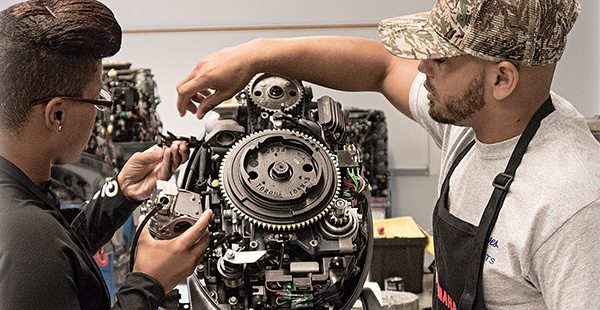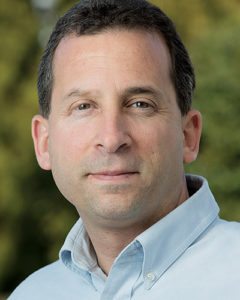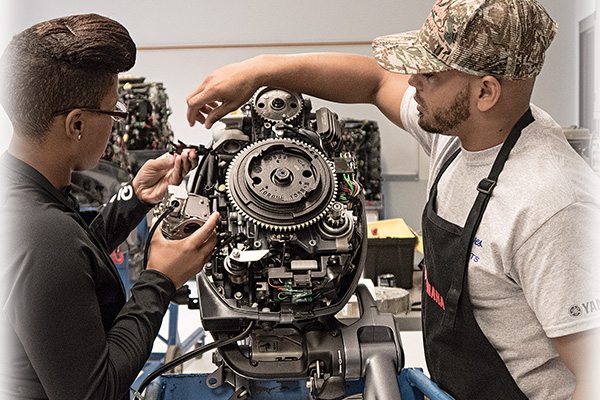Yamaha’s Joe Maniscalco provides update on YMU initiatives, program

Earlier this year, Yamaha Marine announced it was dedicating substantial resources to Yamaha Marine University initiatives, including a much-anticipated apprenticeship program for developing skilled dealer technicians. Through a combination of technical training materials and hands-on training at Yamaha’s marine training headquarters in Pleasant Prairie, Wisc., as well as Yamaha Marine’s headquarters in Kennesaw, Ga., marine technicians will be empowered to tackle the challenges that come with increased consumer time on the water, said Yamaha Marine Group Service Division Manager Joe Maniscalco, who began his career in the marine industry through a work release program from his technical high school that allowed him to work at an automotive and marine repair shop and start there full time after high school graduation. Boating Industry recently visited with Maniscalco regarding the subjects of apprenticeships and technician training.
Boating Industry: What are your first-year goals and objectives with the Yamaha University initiatives that have been announced?

Maniscalco: As far as apprenticeship, I’m personally a product of such a program. My career started when I was accepted into a program at dealership, where I was mentored on my path to becoming a journeyman, and eventually into a leadership role at a dealership, then a role where I was able to implement an apprenticeship at the dealership where I worked. I was able to mentor five apprentices over my dealership career. The goal the first year is to have 40 apprentices and mentors at dealerships. Our process is to create a direct roadmap with resources for our dealerships, to grow technicians who will eventually become Yamaha Master Marine Technicians.
Boating Industry: What improvements and additions will be made regarding instructors, facilities and materials at Yamaha’s marine training headquarters in Pleasant Prairie? Will staff be added or classrooms changed?
Maniscalco: Two years ago, we started a reconstruction of our training facility in Kennesaw. We went from three classrooms from five classrooms. This year, we are working on our facility in Pleasant Prairie, Wisc. We will work on expanding that facility, and doubling its size. We will be integrating all of our training modules in Pleasant Prairie, and bring all of our training opportunities there as our Midwest training headquarters, allowing our business partners to take technicians from entry level to all the way through to master marine level. That’s new for us this year.
Boating Industry: How much additional money is Yamaha Marine investing in this program?
Maniscalco: Yamaha Marine has always had a strong focus on our technical training. The past few years, we’ve really focused on core objectives of what our dealers have been telling us, that we need to develop service personnel, mainly marine technicians. Our focus has been divided into two key areas. The first area involves technical schools in our industry. The second is dealerships and the resources they need to grow potential technicians into quality, high-performing Yamaha marine technicians. Over the past three years, we’ve been allocated resources to donate to technical institutions. In 2018, we’ll donate over $250,000 worth of engines, parts and assemblies to our technical school partners. In 2017, we hired a new person within our YMU training to coordinate our apprentice and our technical school partnership programs. We’ve allocated resources directly to those two key areas of training.
Boating Industry: How did your experiences with the Service Skills Training Program and Technical School Partnership Program impact your decision to dedicate more resources to YMU?
Maniscalco: We wanted to make sure we had an entry level program that focused on the key competencies related to maintenance on Yamaha outboards. That’s where our service skills program started. It’s not teaching the advanced skills or theory around outboard motors; it’s about teaching competencies. We will continue to offer these classes and will expand programs. We are excited about that. This is an area three years ago that we started looking at very closely, and as we visited institutions, it became very apparent curriculum and materials were very out of date. They didn’t have industry support. We had to focus on those schools and get them resources to get students better prepared to go from the institution to a potential Yamaha dealership. We knew those students would have a higher success rate and perform at the level that was needed. What we saw was that classroom materials, in some cases, were dated back to 1985, with the most recent material having been updated in 2002.
Boating Industry: How critical is it to have the apprenticeship program move from the pilot stage to the implementation stage? When is the exact roll-out date?
Maniscalco: The pilot was critical. We needed to understand, at the dealership level, what they were going to be able to implement. More importantly, we needed to determine what we were able to provide and what would fit the number of different service departments found throughout the United States. For example, we needed to address differences between coastal saltwater, to off-shore saltwater, to large boat, to smaller boat, to Midwest dealerships, that didn’t experience saltwater at all, and dealerships that had seasons that were very tight with service departments that were heavily taxed. We needed to develop a roadmap and resources that the dealership would need to make an apprenticeship program successful. What we learned early on was that this process needed to be easy to follow in order for the dealership to be successful. It was simply a resource book to start with, then a more robust electronic support system. Our program will have all of those things in it. We are hoping that this program will be rolled out no later than this summer.

Boating Industry: Please explain the significance of having the apprenticeship program registered with the U.S. Department of Labor, and the dollars that are involved.
Maniscalco: When we started studying apprenticeship programs a few years ago, we needed to understand about apprenticeship programs and what other businesses were doing in their industries. If you look at nursing, plumbers, and welders, they have very structured programs that are registered with the U.S. Department of Labor. We started investigating them, and they have 75 years of experience with skilled workforce. It made perfect sense for us to develop a program that was based on their standards and requirements, and I’m happy to say we were able to get approved by the U.S. Department of Labor for the Yamaha Marine Apprentice Program. Why is this so important? They have a standard, and following their guidelines, we knew we could be successful. What they bring to the table for our partners is resources in each state. Each office will help support implementation. We’ve seen states that could provide up to 50 percent of the apprentice’s pay for six months. Other states provide a lump sum to dealers that implement successfully. We have limited resources. It made sense to grab every possible benefit that the United States offers its citizens and bring it to our industry table.
Boating Industry: What type of response have you received from your industry sources regarding the apprenticeship program and Yamaha’s willingness to put more resources behind its dealer and technician education efforts?
Maniscalco: It’s been overwhelmingly positive. When you start talking about technician development or apprenticeships, you usually get one or two people coming up and saying, ‘I want to take this on now, what can you give me.’ The response has been extremely positive from the dealer network side, and from our partner institutions. There needs to be a two-sided focus to developing technicians. Institutions get students prepared and the dealerships provide the path to the industry. From both sides, we are getting an overwhelming response.





